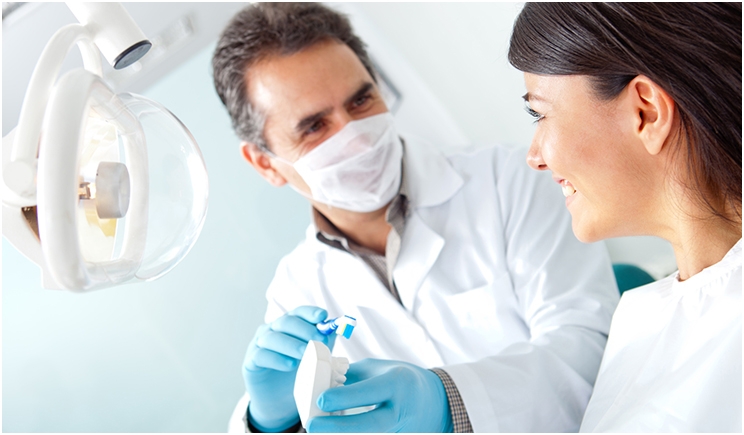
The links between oral diseases and systemic conditions are strong. Seven of the 10 leading causes of death reported by the Centers for Disease Control and Prevention have been connected to inflammation and/or bacteria in the oral cavity: heart disease, cancer, chronic lower respiratory diseases, stroke, Alzheimer’s disease, diabetes, and influenza and pneumonia. As a general dentist, I not only want to treat my patients’ oral health needs, I also want to help them improve their overall health. This is one of the reasons I became a dentist.
The beauty of how impactful the dental industry has become is revealed in our practice of the early detection of systemic health conditions. When a general dentist identifies a condition such as diabetes or high blood pressure early in its development, there is a greater chance of stopping its acceleration and improving the outcome of its treatment.
For example, every day I find some systemic asymptomatic sign of oropharyngeal acid erosion that has been present for more than six months in my patients without them ever thinking they had to see their physician. These patients may have a gastroenterological condition preventing acids from being contained within the stomach and creating chemical burns that could result in voice changes or loss or even neoplastic changes.
The early identification of any such changes could prevent this type of lesion from progressing into a cancerous condition that could have been avoided by early referral to their family physician, otorhinolaryngologist, or gastroenterologist for further evaluation and necessary treatment.
In fact, dentists can monitor such symptoms and intervene to ensure that their patients’ overall health can be improved by the same primary intervention we practice in the dental office during these wellness visits. General dentists are the missing link to the medical community, as we play a significant role in enhancing our patients’ overall health outcomes.
Patients need to consider that what is happening within their mouth goes beyond their teeth and gums. I use my time with my patients to screen for various conditions, such as undiagnosed hypertension, diabetes, hormonal imbalances, blood dyscrasias, respiratory insufficiencies, sleep apnea—the list goes on.
The mouth is the portal to health. It also provides a view into systemic conditions for those who are properly trained in oral medicine, which is something we study for the rest of our professional lives. I want to educate patients about behaviors that will improve their health and connect them with medical professionals if necessary.
I want patients to understand the importance of general health maintenance steps such as good eating habits. Also, practicing oral maintenance means brushing, flossing, and rinsing after meals. Teaching our patients proper oral maintenance enables us to develop a good relationship with them. It allows us to help them understand the connectivity between oral and overall health as well, and it’s something we are committed to in my office. I discuss healthy eating habits as well as the optimal ways of consuming what they choose to consume with minimal negative impact in their health. I educate patients about ways they can improve their health, not just prevent caries.
Collaboration with Other Physicians
We also need to collaborate with our medical colleagues to ensure that our patients are connected with and followed up with a physician once we’ve observed an unexpected change or lesion. Hopefully medical and dental schools will create more joint curricula to enhance the effectiveness of these two disciplines for the benefit of our common patients.
For example, the Academy of General Dentistry (AGD) is partnering with the American Academy of Family Physicians and American Association of Diabetes Educators on a project to improve the health of people living with diabetes to ensure that they have access to the care they need.
This collaboration aims to make available to patients the various treatment modalities to potentiate the health outcomes provided by health professionals that should have occurred all along. We are also developing communication protocols and forms that can enhance this collaboration and communication among dentists and physicians.
Meanwhile, AGD’s continuing education offerings and Fellowship and Mastership awards foster and recognize continuous learning, as well as give back to both organized dentistry and our communities. We offer general dentists resources that help them run their practice with ease and efficiency so they can more effectively impact the health of their patient population while making their offices more successful.
Additionally, AGD provides the proper resources to ensure that our members stay on top of the latest trends, access tools and information, and have the knowledge they need to advocate for quality oral and systemic healthcare for their patients and the profession.
Dentists have maximized the effectiveness of primary prevention by the effective deployment of scientific discoveries as well as the adoption of cutting-edge technology. We welcome the collaboration with other medical professions to see how much more effective their treatment could be if we work together to coordinate the care we give our common population.
Dr. Cordero is the president of the Academy of General Dentistry. He practices general dentistry in Sewell, NJ. He received his BA degree in Spanish literature, with a minor in fine arts along with a degree in secondary education from Bryn Mawr College. He went on to graduate from the Temple University School of Dentistry. Dr. Cordero has been involved with the Academy of General Dentistry since 1987. He can be reached at dentalmac@gmail.com.
Related Articles
AGD Installs New Officers for 2018
AGD Offers Six Steps to Promoting Oral Health Literacy
Patients Underestimate What General Dentists Can Do











